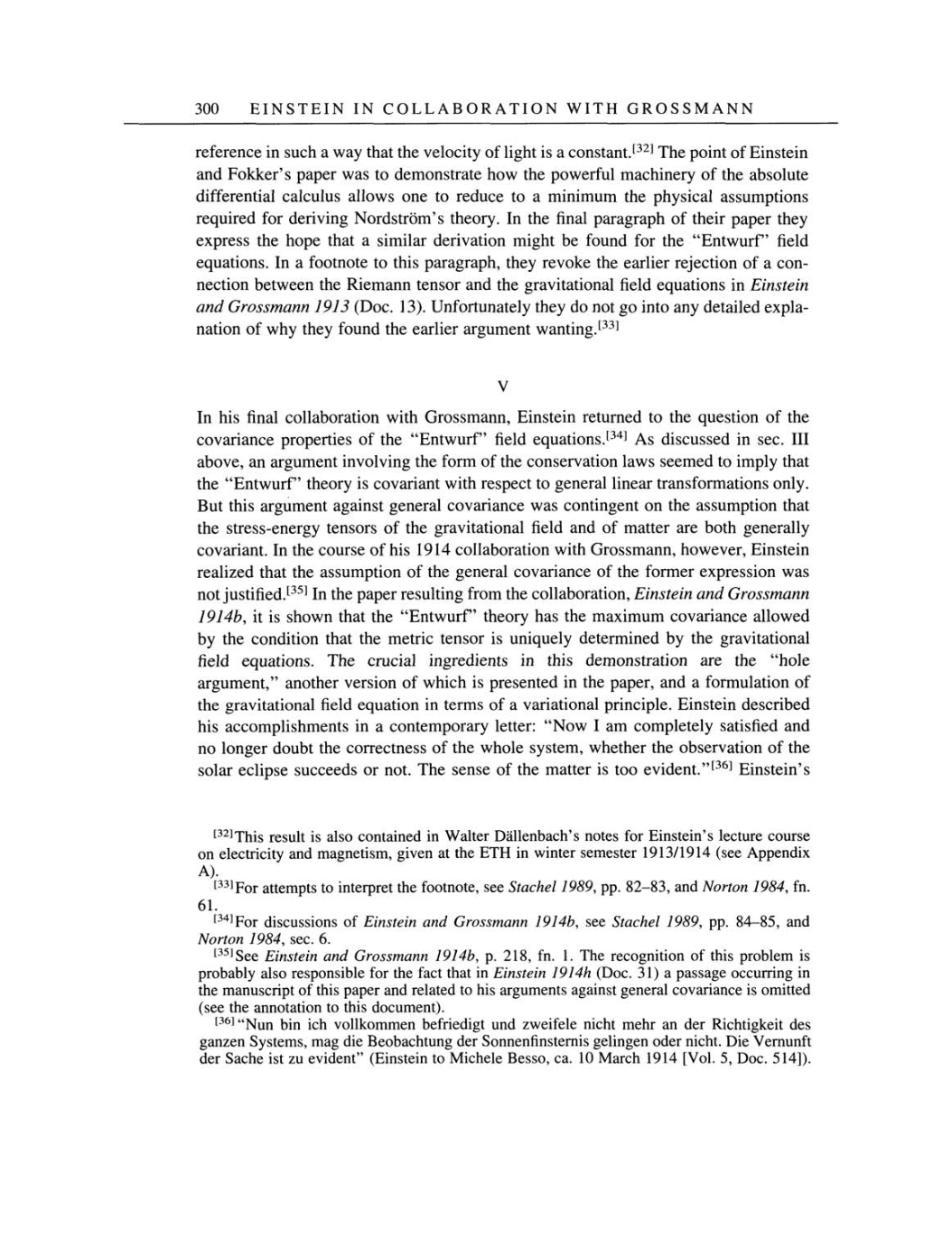300
EINSTEIN
IN COLLABORATION WITH GROSSMANN
reference
in such
a
way
that the
velocity
of
light
is
a
constant.[32]
The
point
of Einstein
and Fokker's
paper
was
to
demonstrate how the
powerful machinery
of the absolute
differential calculus allows
one
to
reduce
to
a
minimum the
physical
assumptions
required
for
deriving
Nordstrom's
theory.
In
the
final
paragraph
of their
paper they
express
the
hope
that
a
similar derivation
might
be
found for the "Entwurf"
field
equations.
In
a
footnote
to
this
paragraph, they
revoke the earlier
rejection
of
a con-
nection between the Riemann
tensor
and the
gravitational
field
equations
in
Einstein
and
Grossmann 1913
(Doc. 13). Unfortunately they
do not
go
into
any
detailed
expla-
nation of
why they
found the earlier
argument
wanting.[33]
V
In
his final
collaboration with
Grossmann,
Einstein returned
to
the
question
of the
covariance
properties
of
the
"Entwurf"
field
equations.[34]
As
discussed
in
sec.
III
above,
an
argument involving
the form of
the
conservation laws seemed
to
imply
that
the "Entwurf"
theory
is covariant
with
respect
to
general
linear transformations
only.
But this
argument against general
covariance
was contingent on
the
assumption
that
the
stress-energy
tensors
of the
gravitational
field and
of
matter
are
both
generally
covariant.
In
the
course
of
his 1914
collaboration with
Grossmann, however,
Einstein
realized that the
assumption
of the
general
covariance of the former
expression
was
not
justified.[35]
In
the
paper
resulting
from the
collaboration,
Einstein and Grossmann
1914b, it
is
shown that the "Entwurf"
theory
has the maximum covariance allowed
by
the condition that the metric
tensor is
uniquely
determined
by
the
gravitational
field
equations.
The crucial
ingredients
in this
demonstration
are
the "hole
argument,"
another version of which
is
presented
in
the
paper,
and
a
formulation of
the
gravitational
field
equation
in terms
of
a
variational
principle.
Einstein described
his
accomplishments
in
a
contemporary
letter:
"Now
I
am
completely
satisfied and
no
longer
doubt the
correctness
of the whole
system,
whether the observation of the
solar
eclipse
succeeds
or
not.
The
sense
of the
matter is too evident."[36]
Einstein's
[32]This
result
is
also contained
in
Walter Dällenbach's
notes
for Einstein's lecture
course
on electricity
and
magnetism, given
at
the ETH
in
winter
semester
1913/1914
(see Appendix
A).
[33]For
attempts
to
interpret
the footnote,
see
Stachel
1989,
pp.
82-83,
and
Norton
1984,
fn.
61.
[34]For
discussions of Einstein and Grossmann
1914b,
see
Stachel
1989,
pp.
84-85,
and
Norton
1984, sec.
6.
[35]See
Einstein and Grossmann
1914b,
p.
218, fn.
1.
The
recognition
of
this
problem
is
probably
also
responsible
for the fact that
in
Einstein 1914h
(Doc. 31)
a
passage occurring
in
the
manuscript
of
this
paper
and related
to
his
arguments against general
covariance
is
omitted
(see
the annotation
to this document).
[36]"Nun bin ich vollkommen
befriedigt
und
zweifele nicht mehr
an
der
Richtigkeit
des
ganzen Systems, mag
die
Beobachtung
der Sonnenfinsternis
gelingen
oder nicht. Die Vernunft
der Sache ist
zu
evident"
(Einstein to
Michele
Besso,
ca. 10
March
1914
[Vol. 5,
Doc.
514]).
